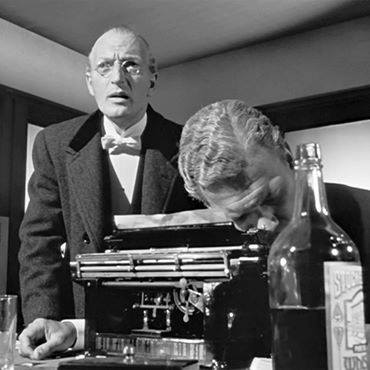“Tragedy, when it works, leaves no room for tears.”
Sidney Lumet, Making Movies
Terry Teachout on the arts in New York City
“Tragedy, when it works, leaves no room for tears.”
Sidney Lumet, Making Movies
In today’s Wall Street Journal “Sightings” column, I discuss the problem of critical error—and how unconscious prejudices often contribute to it. Here’s an excerpt.
* * *

Critics like to think their opinions are more than that, but we all know better. We’re always getting things wrong, usually by failing to appreciate the virtues of the new. Otis Ferguson, one of the shrewdest film critics who ever lived, actually panned “Citizen Kane” for being too talky. Another case in point is the now-notorious review in which Brooks Atkinson dismissed the original 1940 production of “Pal Joey” as “drab and mirthless.” To Atkinson’s credit, though, he changed his mind when he reviewed the 1952 Broadway revival, praising “Pal Joey” the second time around for “the terseness of the writing, the liveliness and versatility of the score, and the easy perfection of the lyrics.”
I have a feeling that Atkinson fell victim in 1940 to unconsciously letting his prejudices get in the way of his perceptions, a less well-known but equally insidious source of critical error that can apply to revivals as well as new works….
H.L. Mencken was onto something when he claimed that criticism is “no more than prejudice made plausible.” Take John Simon, the dean of American film and theater critics, who nevertheless once wrote that “I consign anyone considering ‘The Searchers’ a masterpiece…beyond the critical pale.” Yet John Ford’s now-classic 1956 Western ranked #7 on Sight & Sound’s most recent critics’ poll of the greatest films of all time….
* * *
Read the whole thing here.“I don’t know why I feel like this, but rehearsal halls should always be a little grungy.”
Sidney Lumet, Making Movies
Gloria Swanson appears as the guest in excerpts from a 1957 episode of This Is Your Life, hosted by Ralph Edwards:
(This is the latest in a series of arts- and history-related videos that appear in this space each Monday, Wednesday, and Friday)
“Critics talk about style as something apart from the movie because they need the style to be obvious. The reason they need it to be obvious is that they don’t really see. If the movie looks like a Ford or Coca-Cola commercial, they think that’s style. And it is. It’s trying to sell you something you don’t need and is stylistically geared to that goal.”
Sidney Lumet, Making Movies
From 2009:
Read the whole thing here.I arrived in Santa Fe early yesterday evening, dropped my bags at the rented condo where I’ll be spending the next three weeks, called Mrs. T and my mother to let them know that I was in one piece, then went off to dinner with Paul Moravec, composer of The Letter, which opens in twelve days….
“Arthur Miller’s first and, I think, only novel, Focus, was, in my opinion, every bit as good as his first produced play, All My Sons. I once asked him why, if he was equally talented in both forms, he chose to write plays. Why would he give up the total control of the creative process that a novel provides to write instead for communal control, where a play would first go into the hands of a director and then pass into the hands of a cast set designer, producer, and so forth? His answer was touching. He said that he loved seeing what his work evoked in others. The result could contain revelations, feelings, and ideas that he never knew existed when he wrote the play. It’s what we all hope for.”
Sidney Lumet, Making Movies

Mrs. T was discharged from New York-Presbyterian Hospital last night and returned at long last to our apartment in Upper Manhattan, weary but happy. Her overall condition is far more stable than I’d expected it to be—she says it’s been months since she’s felt this good—and it now seems reasonable to hope that she’ll be able to wait for the Big Call at the apartment instead of the hospital.
If you’ve kept up with the labyrinthine tale of Mrs. T’s illness-related travails, you won’t need to be reminded of what the two of us have been through since her health first took a frightening turn for the worst (and no, that’s not a typo) last August. What’s more, nobody needs to remind us that things could still get worse, suddenly and without warning: we’ve been there, over and over and over again. All we can do now is follow the doctors’ orders, revel in being together again, and hope for the best. That’s our plan.
To the countless people who’ve sent us good wishes: bless you all. We hear you loud and clear, and it means the world.
| M | T | W | T | F | S | S |
|---|---|---|---|---|---|---|
| 1 | 2 | 3 | 4 | |||
| 5 | 6 | 7 | 8 | 9 | 10 | 11 |
| 12 | 13 | 14 | 15 | 16 | 17 | 18 |
| 19 | 20 | 21 | 22 | 23 | 24 | 25 |
| 26 | 27 | 28 | 29 | 30 | 31 | |
An ArtsJournal Blog